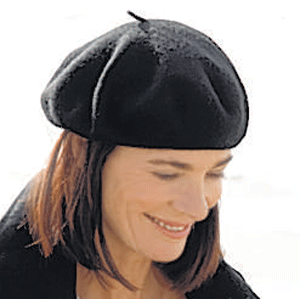Made in Aquitaine: a guide to local crafts

In a small workshop behind the square in Bages, a wine village in Pauillac, Pierre Eveillard is hard at work. A wooden table slopes away in front of him; on it is a flat base, into which tall wicker stalks have been attached, the beginnings of a basket suitable for bread. Tables all around the workshop display other wicker products, all for sale, and made by Pierre and his colleague Carine Koffmann, ranging from egg cups at €5 to large linen baskets priced at €200. Bundles of twigs from 40 different types of willow are propped up all around the workshop, while others are soaking, which softens them up in readiness for the weaving process.
While wine-making, Aquitaine’s best-known craft, is becoming increasingly high-tech, some of the region’s other traditional skills, like basket-making, are being revived. There were 140,000 basket makers in France in the years between the two world wars; now there are only 150. Eveillard thinks it important that crafts such as his should be preserved, a view shared by others in the region, such as Ania Canaux. Four years ago she began making organic soap, using high-quality ingredients and a traditional method of production, in which the soap is mixed, moulded and cut by hand. Already the Savonnerie Saponaire has become a flourishing business, selling its products in outlets all over France, as well as online; soon an annexe will be added to Ania’s workshop at Monflanquin, a beautiful village in the Lot Valley, so that she can sell her soap directly to passing visitors.
All over the region, craftsmen are returning to their roots. Sylvie Berson is an artisan potter, who sells her jugs and bowls from her home, the Ferme de Soulies in Casteljaloux, where she also runs pottery classes to pass on her skills to others. In Osses in the Basque country, Goicoechea Pottery is a family business, where earthenware pieces are now produced by a third |generation of potters. Pre-booked visits can be made to the workshop and factory, and the products are sold from a shop in Biarritz.
Culinary traditions abound in the region, too. Especially delicious are the small, moulded cakes known as caneles, thought to have originated in 18th-century Bordeaux, and now widely |available from good bakeries. They can be eaten alongside a coffee or as a dessert, and are at their best when they are crunchy on the outside, with a softer, almost custard-like texture inside. But this is predominantly farming country, renowned for its agricultural products, from Agen prunes to Bayonne ham, as well as some excellent cheeses like the tasty Ossau-Iraty, made in the Basque region from sheep’s milk.
The textiles produced in the workshops of Tissage Moutet on the Route de Biron in Orthez, just outside Pau, with their bright colours and striking designs, are an example of an ancient tradition that has been adapted for modern times. Equally traditional is the béret, at once the uniform of the stereotypical Frenchman, but these days also a stylish fashion statement available in a multitude of colours. Bérets are still made in the Bearn region, and the Béret museum in the small town of Nay, just outside Pau, has a historical collection as well as a shop selling more contemporary designs to suit your outfit.
Farming in a region of climatic extremes has led to the evolution of another of Aquitaine’s most characterful products. In a workshop in Pau, Christophe Pando, helped by his father Herve, makes large, sturdy umbrellas originally designed to |protect shepherds and |hunters from the rain, wind and harsh sun encountered on the mountains. Each umbrella takes four hours to make. “We’re always working,” says Christophe. “You won’t come in here and find us resting.” Demand remains buoyant, although the customers have changed. Nowadays, the umbrellas are particularly popular with the golfers who visit the region.
Further information
* Atelier Nat’Osier, Place du Sauvignon, Hameau de Bages, Pauillac (00 336 19 02 64 31; villagedebages.com )
* Savonnerie Saponaire, Monflanquin (00 335 53 36 46 15; saponaire.com )
* La Poterie de Soulies, Casteljaloux (00 335 53 79 95 54; lafermedesoulies.com)
* Goicoechea Poterie, Place Bellevue, Biarritz (00 335 59 24 62 57; poterie-goicoechea.com)
* Tissage Moutet, Route de Biron, Orthez (00 33 5 59 69 14 33; tissage-moutet.com)
* Musée de béret, Place Saint Roch, Nay (00 335 59 61 91 70; museeduberet.com )
* Parapluie de Berger, 12 Rue Montpensier, Pau (00 335 59 27 53 66; parapluiedeberger.com )
Subscribe to Independent Premium to bookmark this article
Want to bookmark your favourite articles and stories to read or reference later? Start your Independent Premium subscription today.

Join our commenting forum
Join thought-provoking conversations, follow other Independent readers and see their replies